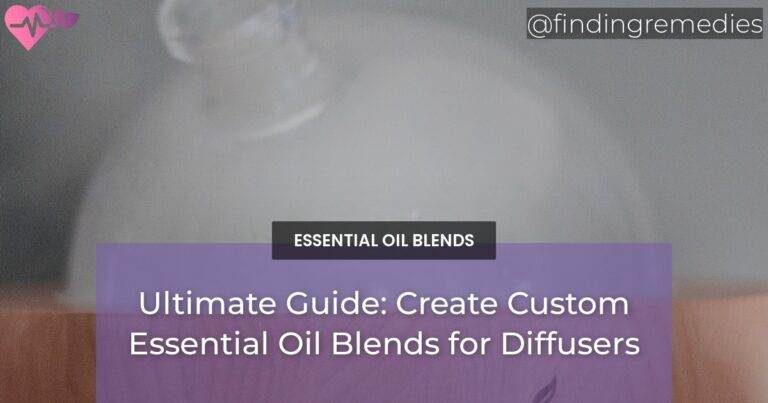Essential oils have been used for centuries for their therapeutic benefits, and aromatherapy is a popular way to use these oils in daily life. One great way to enjoy the benefits of essential oils is by using a diffuser to waft the oils throughout your home.
In this article, we will go over everything you need to know to create your own essential oil blends for diffusers, from choosing the right oils to making blends for relaxation, energy, focus, colds and flu, allergies, and sleep.
Table of Contents
Benefits of Essential Oils
Essential oils have a wide range of therapeutic benefits, including:
- Relaxation
- Energy
- Focus
- Colds and flu relief
- Allergy relief
- Sleep aid
Essential oils can also be used to purify the air, combat stress, and enhance overall wellness.
Choosing the Right Essential Oils
What are some essential oils commonly used in diffuser blends?
There are many essential oils to choose from when creating your own diffuser blends. Some of the most commonly used essential oils for aromatherapy include:
- Lavender
- Peppermint
- Lemon
- Eucalyptus
- Tea tree
- Bergamot
- Frankincense
- Chamomile
How do I choose the right essential oils for my needs?
When choosing essential oils for your diffuser blends, consider your desired outcome. If you want to relax, opt for calming oils like lavender and chamomile. If you need an energy boost, try invigorating oils like peppermint and lemon. Experiment with different combinations until you find the perfect blend for you.
Dilution Ratio
ALSO READ
What is a dilution ratio?
A dilution ratio is the amount of essential oil you add to a carrier oil. Essential oils are highly concentrated and should always be diluted before use.
How do I properly dilute essential oils for use in a diffuser?
You don’t need to dilute essential oils for use in a diffuser, but if you plan to use your oils topically or in a spray, be sure to follow a dilution ratio of 2-3 drops per tablespoon of carrier oil.
Choosing a Diffuser
ALSO READ
What types of diffusers are available?
There are several types of diffusers to choose from:
- Ultrasonic diffusers
- Nebulizing diffusers
- Evaporative diffusers
- Heat diffusers
Which type of diffuser is best for my needs?
Ultrasonic diffusers are the most popular and widely available. They use water and ultrasonic vibrations to diffuse essential oils into the air. Nebulizing diffusers use pressurized air to break down oils into a fine mist. Evaporative diffusers use a fan to blow air over a pad or filter that has been saturated with essential oils. Heat diffusers use heat to evaporate oils into the air.
Making Blends for Relaxation
What essential oils are best for relaxation?
Some of the best essential oils for relaxation include:
- Lavender
- Chamomile
- Bergamot
- Ylang Ylang
- Frankincense
What are some diffuser blend recipes for relaxation?
- 3 drops lavender + 2 drops bergamot
- 2 drops frankincense + 2 drops lavender + 2 drops ylang ylang
- 2 drops chamomile + 2 drops lavender + 2 drops bergamot
Making Blends for Energy
What essential oils are best for energy?
Some of the best essential oils for energy include:
- Peppermint
- Lemon
- Rosemary
- Grapefruit
What are some diffuser blend recipes for energy?
- 3 drops peppermint + 2 drops lemon
- 3 drops grapefruit + 3 drops rosemary
- 2 drops peppermint + 2 drops rosemary + 2 drops lemon
Making Blends for Focus
What essential oils are best for focus?
Some of the best essential oils for focus include:
- Peppermint
- Rosemary
- Lemon
- Basil
What are some diffuser blend recipes for focus?
- 3 drops peppermint + 2 drops rosemary
- 2 drops basil + 2 drops rosemary + 2 drops lemon
- 3 drops lemon + 2 drops peppermint
Making Blends for Colds and Flu
What essential oils are best for colds and flu?
Some of the best essential oils for colds and flu include:
- Eucalyptus
- Peppermint
- Tea tree
- Lemon
What are some diffuser blend recipes for colds and flu?
- 3 drops eucalyptus + 2 drops peppermint
- 3 drops tea tree + 2 drops lemon
- 2 drops eucalyptus + 2 drops peppermint + 2 drops tea tree
Making Blends for Allergies
What essential oils are best for allergies?
Some of the best essential oils for allergies include:
- Lavender
- Lemon
- Peppermint
- Basil
What are some diffuser blend recipes for allergies?
- 2 drops lavender + 2 drops lemon + 2 drops peppermint
- 3 drops lavender + 2 drops basil
- 2 drops lemon + 2 drops peppermint + 2 drops basil
Making Blends for Sleep
What essential oils are best for sleep?
Some of the best essential oils for sleep include:
- Lavender
- Chamomile
- Ylang ylang
- Vanilla
What are some diffuser blend recipes for sleep?
- 3 drops lavender + 2 drops chamomile
- 3 drops ylang ylang + 2 drops vanilla
- 2 drops lavender + 2 drops ylang ylang + 2 drops chamomile
Conclusion
Creating your own essential oil diffuser blends is a fun and easy way to enjoy the therapeutic benefits of aromatherapy. With a few key ingredients and some experimentation, you can create unique blends that are perfect for your needs. Whether you need relaxation, energy, focus, relief from colds and flu, allergies, or sleep, there’s an essential oil blend that’s perfect for you.

